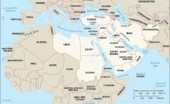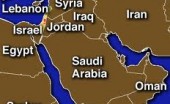Molly Minturn - My family is heartbroken to share that my father died in surgery on Monday, Feb. 10. It…
Wednesday Night #1310
Written by Diana Thebaud Nicholson // April 11, 2007 // Agriculture & Food, Asia, Biofuels, Cleo Paskal, Climate Change, Economy, Geopolitics, Health & Health care, Herb Bercovitz, Middle East & Arab World, Reports, Wednesday Nights // Comments Off on Wednesday Night #1310
11 April 2007
Hoping that your Easter/Passover holiday was pleasant and the Easter eggs were not all frozen in the snow banks, we remind you that there is no holiday for busy Wednesday Night minds.
Last week, Cleo Paskal helped us to focus throughout the evening on the issues surrounding climate change and the need to distinguish it from environmental change. This week we turn to more topics, but maintain the global outlook.
The Economist has very kindly informed us that the following items will be in the news this week:
France’s presidential election [who knew there are 34,000 French citizens in Montreal who have registered to vote?]
China’s prime minister’s visit to Japan – but in the list of topics for discussion, there is no mention of China’s intention to participate in post-Kyoto talks nor of proposed cooperation on environmental issues between the two countries
Problems arising from the expected failure of North Korea to miss a deadline to shut down its plutonium reactor at Yongbyon on April 14th
The spring meetings of the International Monetary Fund and the World Bank in Washington, DC, and attempts to restart the Doha round of world trade talks at a meeting of trade ministers from the U.S., the EU, India and Brazil
We would add:
Iran’s claims to have made a dramatic leap forward in its nuclear programme by enriching uranium on an industrial scale
The continuing turmoil in Iraq as the fourth anniversary of the fall of Baghdad and the end of Sadam Hussein’s rule
Venezuela’s threatened showdown over oil with a plan to wrest control of several key oil projects from American and European companies
The to-ing and fro-ing over whether the British marines and sailors would be allowed to sell their stories of captivity in Iran to the media
and of course, the Mistrial request by Conrad Black co-defendant, John Boultbee
We are hopeful that Kimon Valaskakis will be with us to further some discussion of these international events in the light of the continuing need for Good Global Governance.
Despite the panoply of international topics, we admit to a certain fascination for some local issues such as when the federal election may be called by Prime Minister Harper – and whether L. Ian is right in suggesting that ” Being prime minister is the best part of Stephen Harper’s job. Actually, it’s the role of prime minister, as opposed to the job, that’s the best part. And every day he’s in that role, being prime ministerial, is one more day he’s not some scary guy with a hidden right-wing agenda.”
Appointments – and musical chairs – in the new Liberal (minority) Cabinet in Québec. One pundit remarks that “With a smaller caucus of only 48 members, he can have jobs for everyone – half his caucus can be in cabinet, and the other half can be parliamentary secretaries or committee chairpersons.” The alternative is to shrink the Cabinet. Bets anyone?
And in Westmount – what are the bets on who replaces Lucienne Robillard as the Liberal candidate? Will there have to be an imposed candidate due to lack of time for due process – with all the baggage that imposition will entail? Wednesday Night does not lack for putative candidates who would like to see a spirited debate before election of the standard bearer – it is high time, in our opinion, that we were favoured with that opportunity, but we are not optimistic.
Finally, for the amusement of the legal mavens and nitpickers among us, we suggest Dick Cavett’s blog of March 28 in the New York Times wherein he raises the question of the origins of the presumption of innocence – a fascinating and informative read.
The Report
Introduction
We would be remiss if we did not mention the presence of new guest, Dr. Margaret (Meg) Graham of McGill’s faculty of Management who is a business historian and specializes within her field in technological and business innovation. She is also the author of books on Corning and on the aluminum industry.
Natasha Fotopulos spoke about her recent trip to Rwanda to visit her daughter, also Natasha, who is working in a hospital, as well as with the orphanage run by the Sisters of Mercy. One of “Tashi’s” projects is setting up a bakery to give a group of genocide orphans the skills to earn a living; this project is partially funded by a bakery owner in Nova Scotia.
Scribe’s Prologue
As living creatures climb the evolutionary ladder, the cerebrum, the reasoning part of the brain, grows larger and especially in humans, plays a greater part in motivation than the cerebellum, the instinct centre, in the preservation of the species. Thus, humans tend to value self-preservation and self-satisfaction over the survival and well-being of their species. While laudable, even volunteerism and charity would not exist if they did not reward the donor of unpaid service with some measure of satisfaction. Were there no payoff other than financial and social, politicians would be rare, soldiers would not risk their lives and youths would not volunteer to end their personal existence for a cause or for buying the myth of the glories of war, nor would suicide bombers exist. It is in this context of personal gain and loss that climate change and the continuing political and military climate colour our reaction. Our cerebellum causes us to fear the future, but our cerebrum leads us to question the motivation of the providers of information. Life on this planet, the only one, as far as we know, where life currently exists, may be at stake if we cannot objectively determine what information is accurate and what is to be gained by those disseminating information that is not.
Climate Change (continued from Wednesday Night, April 4)
Carbon dioxide emissions are warming the atmosphere. It has been reported that a child wandering away from its parents in the vicinity of a volcano, died of asphyxiation in an atmosphere of eighteen to twenty percent carbon dioxide. Is it conceivable that carbon dioxide emissions might at some point reach that level everywhere, ending life on earth? Arctic ice was three weeks late in freezing, three weeks earlier in breaking up this year. If all natural ice on earth were to melt, the sea level would rise by two hundred and sixty vertical feet. Underwater earthquakes in the Mediterranean are slowly tipping Africa into that sea which, it has been predicted, will disappear within the next century. Except for Europe, however, the Kyoto Protocol appears to have been little more than an expensive joint literary exercise.
David Suzuki has been warning about climate change for many years, but it has been Al Gore and his Inconvenient Truth that have tweaked the collective cerebella of at least North American humans. Cynics, however, abound, even on Wednesday Night.
[Editor’s note: One Wednesday Nighter referred to Michael Chrichton’s novel, “State of Fear” as a refutation of scientific findings regarding climate change, mentioning in particular his interview with Charlie Rose . Dr. (MD) Crichton is an accomplished author of mainstream literature, however, he has been known to sacrifice facts for a good story – as anyone in the aeronautical world will attest regarding “Airframe” – we suggest, therefore, consulting the Earth Institute’s response to Dr. Crichton’s claims before accepting “State of Fear” as gospel]
There are those motivated by political, financial or other concerns who find it more profitable to ignore the existence or inevitability of climate change and many who, through more noble reasoning, point to the Chicken Little syndrome in areas where much human effort has been expended mistakenly or unnecessarily. These include the doomsday twentieth-first century scenario of Y2K, or the long-held belief that acne was caused by high chocolate intake, or gastric or duodenal ulcers by stress or diet.
While accepting the validity of statistics indicating a constantly accelerating rate of global warming, some remind us that the Laurentian Shield was formed by a retreating ice shield, and believe in the inevitability of the earth’s continuing warming; scientists however, are concerned that the natural (cyclical) fluctuation of the past million years or more has been overtaken by a rapid human-induced warming with serious implications for the stability of the climate on which most of life on the planet depends.. The global average temperature is currently in the region of 15C. (Note: Global warming is defined by the global mean surface temperature. The whole globe is not warming uniformly.) Geological and other evidence suggests that, in the past, this average may have been as high as 27C and as low as 7C. The only ways of significantly diminishing the trends of climate change are said to be erupting volcanoes and the ironization of the oceans [the reaction between the salt water and iron that affects the temperature of the oceans], which would buy us more time.
The only way a scientific theory dies is if all its proponents die of old age
Biofuels
The increasing use of cereal crops to produce biofuel derived from crop plants will only lead to increased starvation. “Biofuels … include biomass directly burnt, and especially biodiesel from plant seed-oil, and bioethanol from fermenting grain, sap, grass, straw or wood. [They] have been promoted and mistakenly perceived to be ‘carbon neutral’…. This ignores the costs in carbon emissions and energy of the fertiliser and pesticides used for growing the crops, of farming implements, processing and refining, refinery plants, transport, and infrastructure for transport and distribution. The extra costs in energy and carbon emissions can be quite substantial particularly if the biofuels are made in one country and exported to another, or worse, if the raw materials, such as seed oils, are produced in one country to be refined for use in another. Both are very likely if current trends continue.” [more]
Moreover, agricultural lands given over to the cultivation of crops for biofuel production would no longer be dedicated to crops required to feed the ever-increasing world population. Thus the genuine fear that massive production of biofuels would lead to increased world hunger
Prevention and coping (adaptation)
The history of this planet has seen such changes as the breaking up of the landmass originally formed by West Africa and South America and the disappearance of the land bridge between Alaska and Siberia and gradual, normal warming of the earth, with human migrations giving proof to the adaptability of the species to a wide variation of climatic conditions. Whether or not we, as humans have the capacity to control our environment, our first goal should be to cope and adapt, while still attempting to control it. Europe is well ahead of North America in both, while a number of Asian states have taken important steps in the right direction. Even China is showing the zeal of the newly converted. India unfortunately has not.
[Editor’s note: It has been announced that Alcan Inc. is pulling out of the controversial Utkal project in India, suggesting plans for the bauxite mine and alumina refinery are too risky for Alcan, considering its lack of control over the venture. Some reports suggest that one reason for the withdrawal is Alcan’s inability to obtain the environmental impact studies that indicate possible major population displacements and the project’s lack of fit with Alcan’s approach to sustainability]
Even if we were to completely eliminate the sources of greenhouse gasses, their effects would linger for a long period of time, making it imperative that we act now on both prevention and coping.
Chinese Premier Wen Jiabao on visit to Japan
Traditional enemies, Japan and China, have recently signed an important treaty, “to boost cooperation and build strategic, mutually beneficial relations in economic, energy, environment and other areas,” thereby collectively creating the second or third largest economy in the world. Like any other transaction, treaties are not signed unless both signatories gain. Although this is important strategically, it is unlikely that it represents a melting of the historical chill between these two nations and the rapprochement will most certainly remain superficial until there is resolution of such issues as the ongoing spat over undersea gas and oil deposits, with China’s Foreign Ministry asserting exploration rights in disputed waters between the two neighbours; and of Taiwan (where the Japanese have a long history and interests) and islands in the South China Seas. A distant prospect at best.
The medical brain drain
Although medical schools in Québec have increased the number of students, only eighty-four percent of graduates remain in this province to practice here, largely due to the unwillingness to provide graduating family physicians billing licences for the major cities. While the government has attempted to increase available service by increasing billable hours, both family physicians and the patient population are aging, inevitably leading to further shortages in the coming decade. The political under-representation of the urban centres in the National Assembly enables the politicians to staff the rural areas of the province at the expense of the cities at little or no additional political or financial cost to the province. The system is good, but the political climate is such that unless something is done, we may very well face a further deterioration in service and/or the introduction of a two-tier medical system. The incredible truth appears to be that the apathy and unwillingness on the part of the electorate to publicize and politicize the situation is the major barrier to the solution to salvage an otherwise great health care system.
Nurse practitioners can increase a physician’s group practice to up to 2,500 patients. In Ontario they are on salary ($70-80,000 per year, plus office expenses and assistants) and this arrangement was deemed too expensive for Québec, however this alternative is being looked at.
Once people get access, the level of medical care is quite acceptable
Sainte Famille and the Jewish General have interesting approaches with extended hours
The average age of GPs in Québec is 55
The medical profession is in the hands of the electorate – the public has to make sure it is properly run
[governments have discovered that] the only way you can control expenditures is by controlling the number of practitioners
The U.S. economy
The United States is blithely going into debt while cutting taxes and increasing spending. China continues to transform its current account surplus into U.S. treasury bills. While, at one point, some Senators are reported to have resigned over this issue, Americans do not appear to be worried, nor should they be. Barring an unlikely major protest over the increasing acquisition of foreign businesses by China, or the loss of manufacturing jobs in the U.S., the situation can be easily corrected by the imposition of a national sales tax, universally, the planning window for the government of any democracy, but unlikely in the term of office of the current administration.
[Editor’s note A story on the front page of Friday’s Financial Post neatly summarizes the discussion:
“… while tensions have undoubtedly risen, trade experts say the moves are aimed more at appeasing a domestic audience and there is simply too much at stake for both countries for the skirmish to evolve into a protracted trade battle.
The Chinese governmental system holds US$1-trillion of U.S. notes,” said Alan Alexandroff, research director at the Munk Centre for International Studies at the University of Toronto. “Yes, China would be hit [by new trade penalties] but if the Chinese decided to make a fundamental shift in the reserves it holds, I’ve got to tell you the U.S. dollar would go south and so would the economy, presumably. There’s a kind of economic deterrence…. To push the war analogy a little further, with the U.S. and Chinese economies now so firmly intertwined through trade and capital flows, a state of mutually assured economic destruction appears to have arisen. As with the old Cold War MAD concept, the full-scale use of trade weapons or currency machinations by one side would result in the economic destruction of both.”]
David M. Walker, Controller General of the U.S. and head of the Government Accountability Office has hit the hustings to publicize the dire situation of the U.S. budget and economy, – a topic that is not popular with politicians because the subject of the nation’s long-term fiscal prospects is short on political theatrics and long on complicated economics, scary graphs and very big numbers. Mr. Walker, who is not running for office, has committed to touring the nation through the 2008 elections, talking to anybody who will listen about the fiscal black hole Washington has dug itself, the “demographic tsunami” that will come when the baby boom generation begins retiring and the recklessness of borrowing money from foreign lenders to pay for the operation of the U.S. government.
The U.S., Iraq and the Middle East
Regardless of the results of the 2008 U.S. elections, what will happen in Iraq? Unfortunately, national boundaries delimiting geographic or political rather than tribal territories are frequently a source of problems. A withdrawal of U.S. troops from Iraq would very likely lead to the void being filled by Iran with Iranian influence extending throughout the Middle East, and the total elimination of Israel. Considering the political importance of Israel to the U.S. and the concentration of petroleum in the Mesopotamian basin, this does not appear to be an acceptable solution. Ideally a diplomatic solution, though difficult, appears to have a greater potential for success. Such was the case at the end of World War II when the west considered a preemptive strike against the U.S.S.R. but opted for a containment strategy that succeeded in containing Russia. Unfortunately, in the Middle East, the cultural attitudes of the west would not necessarily make containment a more effective solution than a military one. Perhaps an initiative conceived jointly by diplomats and the military will lead to the peaceful solution to an otherwise intractable problem.



